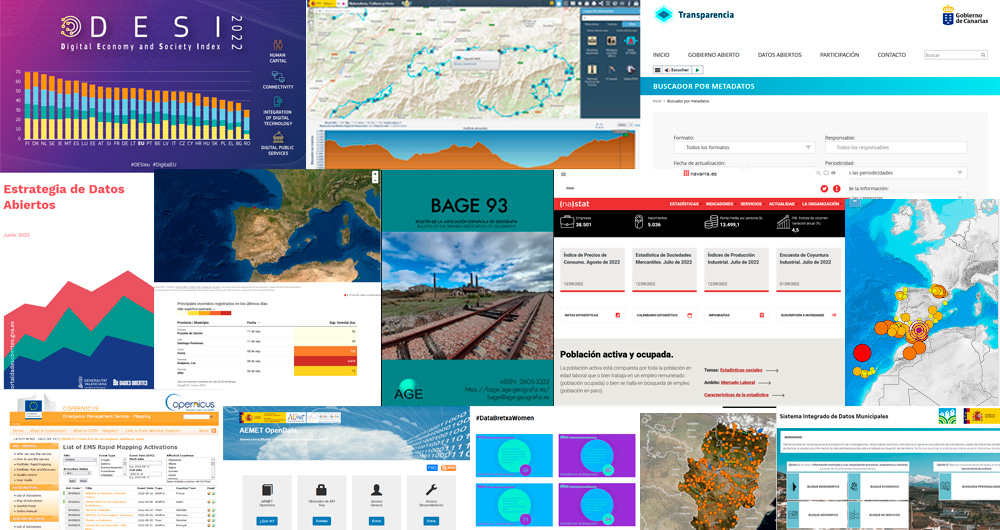News about the open data ecosystem (autumn 2022)
Fecha de la noticia: 19-12-2022

The last few months of the year are always accompanied by numerous innovations in the open data ecosystem. It is the time chosen by many organisations to stage conferences and events to show the latest trends in the field and to demonstrate their progress.
New functionalities and partnerships
Public bodies have continued to make progress in their open data strategies, incorporating new functionalities and data sets at their open data platforms. Examples include:
- On 11 November, the Ministry for the Ecological Transition and the Demographic Challenge and The Information Lab Spain presented the SIDAMUN platform (Integrated Municipal Data System). It is a data visualisation tool with interactive dashboards which show detailed information about the current status of the territory.
- The Ministry of Agriculture, Food and Fisheries has published four interactive reports to exploit more than 500 million data elements and thus provide information in a simple way about the status and evolution of the Spanish primary sector.
- The Open Data Portal of the Regional Government of Andalusia has been updated in order to promote the reuse of information, expanding the possibilities of access through APIs in a more efficient, automated way.
- The National Geographic Institute has updated the information on green routes (reconditioned railway lines) which are already available for download in KML, GPX and SHP.
- The Institute for Statistics and Cartography of Andalusia has published data on the Natural Movement of the Population for 2021, which provides information on births, marriages and deaths.
We have also seen advances made from a strategic perspective and in terms of partnerships. The Regional Ministry of Participation and Transparency of the Valencian Regional Government set in motion a participatory process to design the first action plan of the 'OGP Local' programme of the Open Government Partnership. In turn, the Government of the Canary Islands has applied for admission to the International Open Government Partnership and it will strengthen collaboration with the local entities of the islands, thereby mainstreaming the Open Government policies.
In addition, various organisations have announced news for the coming months. This is the case of Cordoba City Council which is set to launch in the near future a new portal with open data, or of Torrejon City Council which has included in its local action plan the creation of an Open data portal, as well as the promotion of the use of big data in institutions.
Open data tenders, a showcase for finding talent and new use cases
During the autumn, the winners of various contests were announced which sought to promote the reuse of open data. Thanks to these tenders, we have also learned of numerous cases of reuse which demonstrate open data's capacity to generate social and economic benefits.
- At the end of October we met the winners of our “Aporta” Challenge. First prize went to HelpVoice!, a service that seeks to help the elderly using speech recognition techniques based on automatic learning. A web environment to facilitate the analysis and interactive visualisation of microdata from the Hospital Morbidity Survey and an app to promote healthy habits won second and third prizes, respectively.
- The winners of the ideas and applications tender of Open Data Euskadi were also announced. The winners include a smart assistant for energy saving and an app to locate free parking spaces.
- Aragon Open Data, the open data portal of the Government of Aragon, celebrated its tenth anniversary with a face-to-face datathon to prototype services that help people through portal data. The award for the most innovative solution with the greatest impact went to Certifica-Tec, a website that allows you to geographically view the status of energy efficiency certificates.
- The Biscay Open Data Datathon set out to transform Biscay based on its open data. At the end of November, the final event of the Datathon was held. The winner was Argilum, followed by Datoston.
- UniversiData launched its first datathon, whose winning projects have just been announced.
In addition, in the last few months other initiatives related with the reuse of data have been announced such as:
- Researchers from Technical University of Madrid have carried out a study where they use artificial intelligence algorithms to analyse clinical data on lung cancer patients, scientific publications and open data. The aim is to obtain statistical patterns that allow the treatments to be improved.
- The Research Report 2021 that the University of Extremadura has just published was generated automatically from the open data portal. It is a document containing more than 1,200 pages which includes the investigations of all the departments of the centre.
- F4map is a 3D map that has been produced thanks to the open data of the OpenStreetMap collaborative community. Hence, and alternating visualisation in 2D and 3D, it offers a detailed view of different cities, buildings and monuments from all around the world.
Dissemination of open data and their use cases through events
One thing autumn has stood out for has been for the staging of events focused on the world of data, many of which were recorded and can be viewed again online. Examples include:
- The Ministry of Justice and the University of Salamanca organised the symposium Justice and Law in Data: The role of Data as an enabler and engine for change for the transformation of Justice and Law”. During the event reflections were made on data as a public asset. All the presentations are available on the Youtube channel of the University.
- In October Madrid hosted a new edition of the Data Management Summit Spain. The day before there was a prior session, organised in collaboration with DAMA España and the Data Office, aimed exclusively at representatives of the public administration and focused on open data and the exchange of information between administrations. This can be seen on Youtube too.
- The Barcelona Provincial Council, the Castellon Provincial Council and the Government of Aragon organised the National Open Data Meeting, with the aim of making clear the importance of the latter in territorial cohesion.
- The Iberian Conference on Spatial Data Infrastructure was held in Seville, where geographic information trends were discussed.
- A recording of the Associationism Seminars 2030, organised by the Government of the Canary Islands, can also be viewed. As regards the presentations, we would highlight the one related with the ‘Map of Associationism in the Canary Islands' which makes this type of data visible in an interactive way.
- ASEDIE organised the 14th edition of its International Conference on the reuse of public sector Information which featured various round tables, including one on 'The Data Economy: rights, obligations, opportunities and barriers'.
Guides and courses
During these months, guides have also been published which seek to help publishers and reusers in their work with open data. From datos.gob.es we have published documents on How to prepare a Plan of measures to promote the opening and reuse of open data, the guide to Introduction to data anonymisation: Techniques and practical cases and the Practical guide for improving the quality of open data. In addition, other organisations have also published help documents such as:
- The Regional Government of Valencia has published a guide that compiles transparency obligations established by the Valencian law for public sector entities.
- The Spanish Data Protection Agency (AEPD) has translated the Singapore Data Protection Authority’s Guide to Basic Anonymisation, in view of its educational value and special interest to data protection officers. The guide is complemented by a free data anonymisation tool, which the AEPD makes available to organisations
- The NETWORK of Local Entities for Transparency and Citizen Participation of the FEMP has just presented the Data visualisation guide for Local Entities, a document with good practices and recommendations. The document refers to a previous work of the City Council of L'Hospitalet.
International news
During this period, we have also seen developments at European level. Some of the ones we are highlighting are:
- In October the final of the EUdatathon 2022. The finalist teams were previously selected from a total of 156 initial proposals.
- The European Data Portal has launched the initiative Use Case Observatory to measure the impact of open data by monitoring 30 use cases over 3 years.
- A group of scientists from the Dutch Institute for Fundamental Energy Research has created a database of 31,618 molecules thanks to algorithms trained with artificial intelligence.
- The World Bank has developed a new food and nutrition security dashboard which offers the latest global and national data.
These are just a few examples of what the open data ecosystem has produced in recent months. If you would like to share with us any other news, leave us a comment or send us an e-mail to dinamizacion@datos.gob.es














